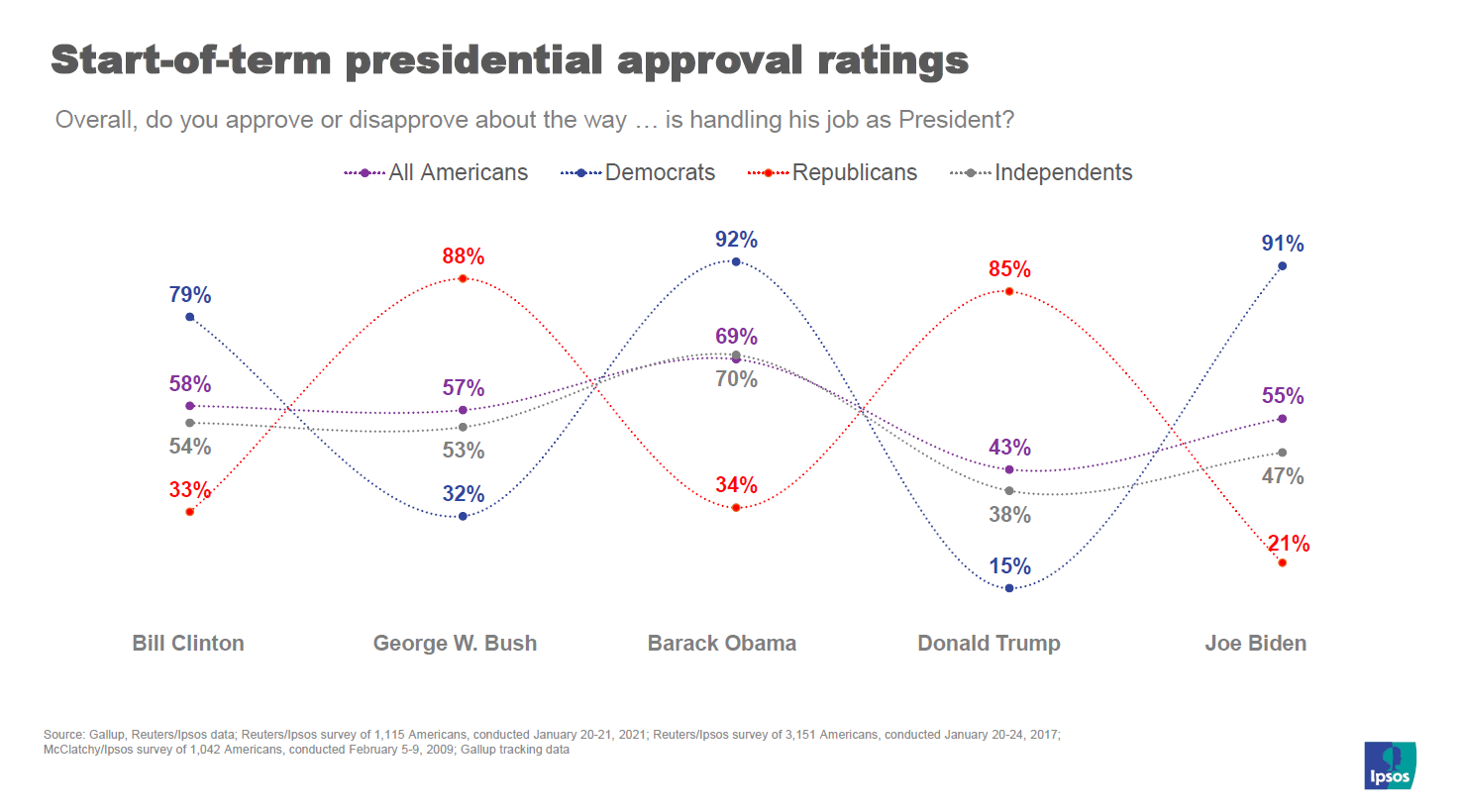What Biden’s approval ratings reveal about the state of the union
What you need to know:
- President Biden will start his presidency with what may be a short-lived honeymoon period – and a 70-point gulf in approval among Democrats and Republicans. This gap is the same as it was for President Trump, underlining just how deeply polarized the nation remains.
- While Biden’s recurrent calls for unity may resonate with both parties, Republicans show signs of unwillingness to compromise.
Deep dive:
Upon taking office, President Joe Biden faces a nation divided. His approval ratings, the consequence of a 70-point partisan divide, serve as a reminder that the polarization of the Trump era is poised to spill over into the next.
However, this partisan disagreement has not completely chipped away at Biden’s early honeymoon period. His post-inauguration approval ratings sit at 55% according to Reuters/Ipsos polling, putting him approximately on par with how Americans viewed former Presidents George W. Bush and Bill Clinton when they too were just starting out.
President Donald Trump, by contrast, was met with a skeptical public from the start of his time in office, initiating his term in January 2017 at a lackluster 43%.

Other recent polling conducted with ABC News points to the positive reception Biden has received so far, with 69% of Americans saying they approve of how he is handling the coronavirus pandemic and majority support for executive actions he took in his first week in office.
However, while views on Biden may be more positive than they were for Trump across the nation as a whole, the gulf between Republicans and Democrats is just as great now as it was at the start of Trump’s tenure. The distance between Democrats and Republicans on Trump was 70 points in January 2017, the mirror image of Biden’s partisan approval ratings today.
In other words, Biden’s early honeymoon is a consequence of sweeping support from Democrats and greater support from Independents than Trump received. The broad brush of partisanship masks yet further division, particularly across the Republican party.
Post-inauguration, 61% of Republicans still believe that the election outcome was illegitimate, according to January 20-21 Reuters/Ipsos polling. Belief that the election was illegitimate has a very real impact on Biden’s approval ratings. Just 9% of Republicans who believe that the election was rigged approve of Biden, compared to his 51% approval rating among Republicans who believe that the outcome was legitimate.
Further, after four years of Trump, the party is now split into a MAGA camp and establishment camp. Over half of Republicans say they identify as “traditional Republicans” (56%), while 36% identify primarily as “Trump supporters.” These fractures across red and blue America – and within the Republican party itself – spell trouble not just for the ambitious slate of legislative priorities Biden is championing but also for healing the ideological rifts plaguing the nation.

Biden ran on a campaign of restoring both the “soul of the nation” and national unity. Around this latter point, there are signs of some bipartisan consensus. A close to even number of Republicans and Democrats rank restoring national unity in second place as a national priority for the incoming administration, behind tackling the coronavirus pandemic.
However, while Republicans might say they want unity, the early signals show that a significant number are disinterested in compromise with the other side. While 46% of Republicans would like their elected officials to work with the Biden administration to achieve common goals, 39% say they want their representatives to actively oppose Biden’s agenda – even if this means that the nation fails to make progress on the most urgent issues of the day. Another 15% are unsure.

On this point too, election skepticism has profound consequences. Among Republicans who believe the election outcome was illegitimate, the number who want their elected representatives to oppose the Biden administration jumps to 58%, as opposed to the 84% who believe that the outcome was accurate and want their representatives to work with the Biden administration.
Further, just 22% of Republicans say they have a great deal or a good amount of confidence in Biden “to make progress on unifying the country,” according to ABC News/Ipsos polling. This stands in contrast with the 86% of Democrats and 59% of Independents who believe he can. Of course, this lack of faith in Biden makes much more sense in light of the number of Republicans who believe he cheated or had help cheating his way into office.
With a 50/50 split in the Senate, Democrats have a narrow avenue to push forward their legislative agenda. In light of the deep vein of skepticism and antagonism from the right, attempts to achieve unity with the more extreme wing of the Republican party (who are already set on thwarting him anyway) may have to fall by the wayside in favor of doubling down on efforts to address the coronavirus pandemic.
Little will have more of an impact on people’s daily lives than getting the nation vaccinated and back towards a semblance of normality. How Biden handles this monumental task will likely be the determining factor in which way Biden’s approval ratings go from here. And in the end, unifying a nation that is no longer buckling under the strain of a once-in-100-year pandemic may be less steep of a hill to climb.


